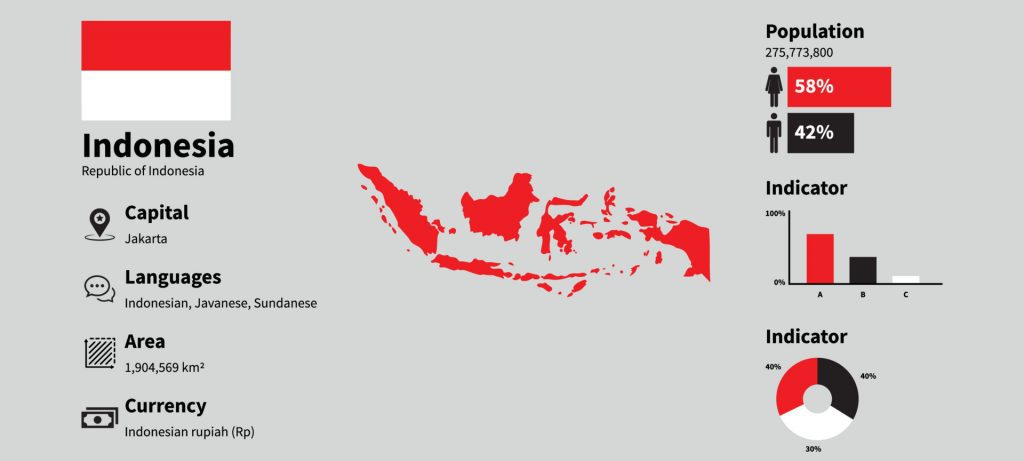The origins of the Indonesian Language
Indonesian is the official and national language of the Republic of Indonesia. It is also referred to as Bahasa Indonesia. As Indonesia has the fourth largest population in the world, it is considered a major language. It is estimated to have about 43 million native speakers, and an additional 156 million speakers who speak it as a second language. It is categorized as an Austronesian language, related languages being ones that come from Southeast Asia and the Pacific Islands. These include close languages such as Javanese and Sundanese, but also farther spoken languages such as Tagalog, Samoan, and even languages from Hawaii. Our Indonesian translators are working from both Jakarta as well as Kuala Lumpur and have native language proficiency.
Indonesian is an especially interesting language because of its history and formation. In terms of history, one can divide it up into three eras that have an interconnected history with Standard Malay. During the early kingdoms era, it was the register of Malay spoken on the Indonesian archipelago as Malay has been used as a lingua franca among the islands for over five hundred years. As trade and other transactions occurred between the various populations on the archipelago occurred and increased throughout time, Old Malay was used as a common language. Subsequently, the different varieties of Malay spoken evolved along the different populations, specifically in Indonesia, Malaysia, and Brunei. In terms of the Malay spoken in Indonesia specifically, Dutch and Javanese influences were especially strong.
We translate Indonesian to English or vice versa for all major industries and can provide an accurate translation that skillfully conveys the same meaning as the source. Our Indonesian team members have been carefully vetted for their outstanding translation skills, experience and abilities coupled with their formal academic qualifications.
During the Dutch colonial era, when the Dutch East India Company arrived and established itself, the Malay language continued to evolve, albeit with its own characteristics in Indonesia as the Dutch used it for administrative purposes. Still, at this time, while Malay was used as a lingua franca, it was not actually a language that was widely spoken, even though it was more spoken than Dutch. With the Dutch influence, a large influx of Dutch vocabulary entered the Malay language at this point.
In the modern era, the Indonesian variety of Malay started to reflect the nationalist movement in Indonesia, especially due to the disappearance of the Dutch. That is, a national identity was established around the Indonesian variety of Malay. Thus, Bahasa Indonesia was born directly from Malay and was adopted as an official language of Indonesia. This occurred relatively recently in 1945 when Indonesia declared its independence and enshrined the language in its constitution, although only 5% of the population in Indonesia spoke it as a native language. Again, this is due to the role of Indonesian operating more as a lingua franca.
 <img ” alt=”” />
<img ” alt=”” />Modern Indonesian thus stems from the Malay language with the Indonesian language considered one of several standardized versions of Malay. Bahasa Indonesia is the official language of the Republic of Indonesia, while Standard Malay is considered the official language of Malaysia. While some consider these two languages two sides of the same coin, others consider them to be separate languages that continue to evolve in separate directions, due to cultural, political, and linguistic factors. Moreover, Indonesian also displays a much stronger Dutch influence on the original Malay in relationship to the other standardized versions, with a large of amount of Dutch vocabulary being absorbed into modern Indonesian.
Most speakers of Indonesian speak it as a second language. In Indonesia, there are over 725 languages spoken and most of these are spoken as a mother tongue by their speakers. However, Bahasa Indonesia acts as a lingua franca between the different populations in this region. Thus, the Indonesian language is commonly spoken in the public sphere, while the hundreds of other languages are used at a more local level. Indonesian in the public sphere serves as the language of business, education, and media, despite most of the speakers using it as a second language.
In terms of grammar, the language is subject, verb, and object, but with a flexibility that may not be found in other languages. In terms of vocabulary, there are thousands of loan words that come from a variety of languages, due to the location of Indonesia as a country of trade, and its historical background, including the various political, commerce, and religious influences. These influences include Sanskrit, Chinese, Arabic, and a variety of European languages, most notably Dutch, due to the colonial history of Indonesia. There are no plural forms, grammatical gender, and verb conjugations, however, making learning the language perhaps an easier endeavor compared to other languages.
The writing system is based on the Latin system of writing, meaning that it is written similarly to English and most other Western languages. There is one letter for each sound and vowels, even though these do not correspond directly with English sounds. Words are separated by a space. There has been a reform to standardize the spelling since its acceptance as an official language. Thus, the writing system of Indonesian can be quite different than other varieties of Malay, including Standard Malay in Malaysia and the Malay used in Brunei. These differences help separate and make unique Bahasa Indonesia as a national language of the Republic of Indonesia.
VEQTA can provide you with a perfect Indonesian translator for your Indonesian translation, English to Indonesian translation and Indonesian to english translation for the your targeted locale. Our translations to Indonesian are created with your target audience in mind to meet your expectations.
If you need to translate Indonesian – Get in touch today!
A dedicated team of Indonesian translators who combines Experience, Specialized Subject Matter Expertise with best Translation Practices to deliver quality second to none.
Indonesian Document Translation
Indonesian Legal Translation
Indonesian I.T Translation
Indonesian Health & Fitness Translation
Indonesian Medical Translation
Indonesian Marketing Translation
Indonesian Financial & Accounting Translation
Indonesian Tourism & Travel Translation


